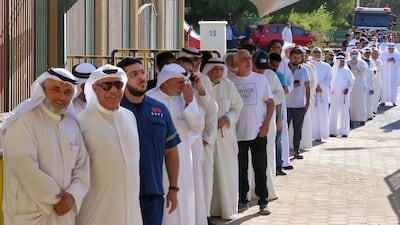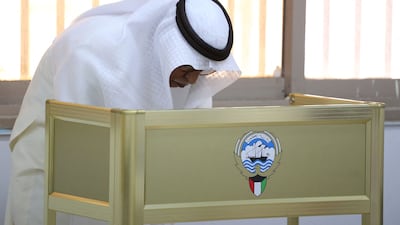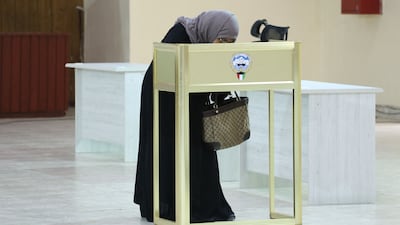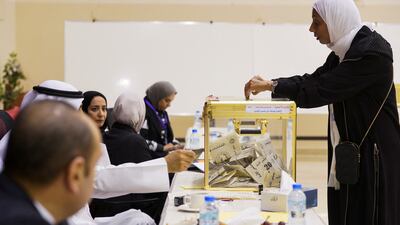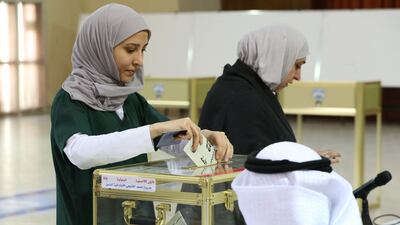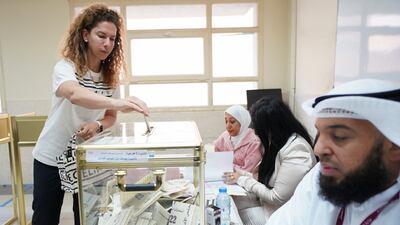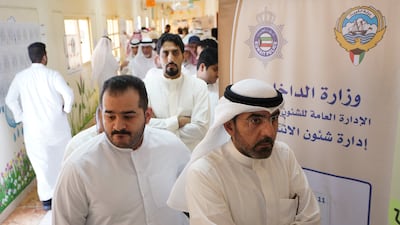Hundreds of thousands of Kuwaitis cast their ballot to elect the country’s next Parliament on Thursday, hopeful new policies aimed at reducing voter manipulation would result in the most representative general assembly in a generation.
For decades, elections for 50 representative seats that make up the bulk of Kuwait’s 65-member Parliament have been mired in residential bloc manipulation. They have also featured predetermined, tribal-based voting and bribing schemes involving candidates indirectly offering citizens 500KWD (Dh5,915) for their ballot.
To counter this, the government has clamped down on voter manipulation and introduced a two-step identification system. This has led many Kuwaitis to view this election, known locally as “democracy’s wedding”, as the most important vote in their lifetimes and a real chance to effect change.
“This time, I think things will be different,” said Sara Al Asfar, 24, one of the almost 800,000 Kuwaitis over the age of 21 eligible to vote. “Even though it’s the first time I go to vote, I’m hopeful change will come. We want to see improvement in our country, from our roads to the entertainment options. It’s important to go out and vote for who you believe will make that change happen.”
Voter turnout has declined in recent years with political confidence also dwindling after a string of parliamentary dissolutions. These have led to only one Parliament carrying out its term in decades.
Kuwaitis say they are desperate for change. Many are asking for more female political representation and equal rights, as well as a clampdown on corruption that has caused a deterioration in the country’s basic infrastructure and civil services.
“I’m a true believer in having both genders in the national assembly, to represent our views and our needs, because we’re both living in the same community. It’s important to have representation so our voices can be heard,” said Fatema Al Matouq, 35, who works at a regional non-government organisation that helps Arab students to prepare for work.
Of the 305 candidates running for Parliament, only 22 are women.
Ms Al Matouq said she wanted Kuwait’s new Parliament to address women’s constitutional rights and change laws that undermine gender equality. She said representatives must engage with people, reassess the nation’s top priorities, and drive their policy-making through data-based decision-making.

Many Kuwaitis believe their vote matters more this year than ever before. Part of this sentiment comes from the nation’s belief in its proud, albeit underachieving, democratically elected Parliament. But in large part, it stems from the government’s recent campaign against voter manipulation.
“For the first time in my life, I’ve seen a voting system that really values organising the process, and ensuring a true representation of the people,” said Saud Al Barrak, 75, who is retired. “It makes me happy; it makes me proud, and it makes it different this time around.”
Each Kuwaiti is allowed a single non-transferable vote, down from five in previous years. Voters are segmented into five 10-seat constituencies based on residential voting blocs.
Previously, all that was required for voters to register was their citizenship certificate and a tenant’s lease as proof of residence. The lack of civil identification and fabricated leases allowed Kuwaitis to register in voting blocs outside their residential areas. This skewed results and disproportionately favoured candidates willing to exploit the system.
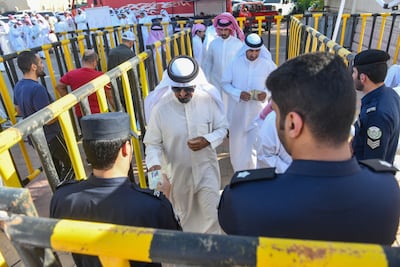
However, for the first time in more than 60 years, Kuwait’s Ministry of Interior and Ministry of Justice has made it mandatory for voters to show not only their certificate of citizenship, but also their civil identification cards. Authorities have also enforced strict laws against voter buyouts.
Several clampdowns have resulted in investigations into candidates in each of the five districts, but Kuwaitis say the shakedown sufficed.
“As cynical as I am, I think it’s the only way we are given a chance to make a change, and when we’re ready, I want to be a part of that,” Mohammed AlSarraf, a 40-year-old Kuwaiti businessman, said of the election. He sees the recent policies aimed at changing the electoral process as a step in the right direction — and says now people must play their part and vote.


